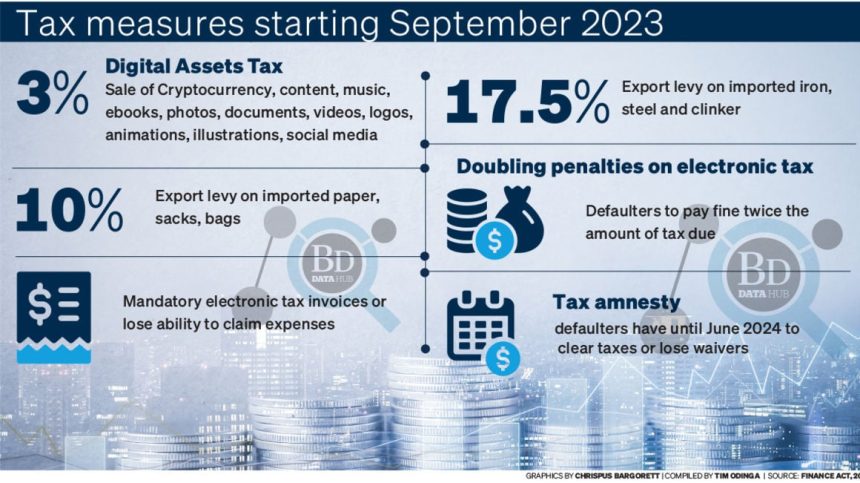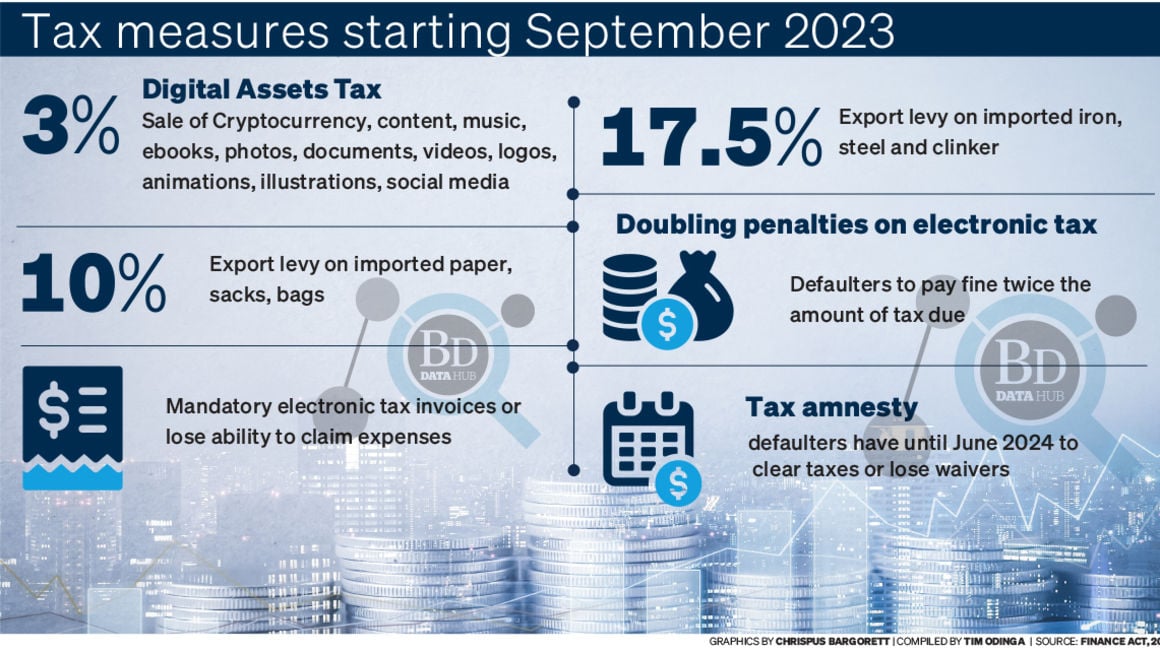The second round of new taxes introduced through the contentious Finance Act 2023 kicks in on Friday, whose impact will be felt across several industries including cement, steel, paper, suppliers, digital and creative economy, and entertainment.
From Friday, September 1, the sale of cryptocurrencies, content, music, ebooks, photos, documents, videos, logos, animations, illustrations and social media accounts, among other digital assets, will attract a 3.0 percent tax.
The digital assets tax (DAT) will be payable on income derived from the digital assets as President William Ruto’s administration moves to take a share of the digital economy in pursuit of the Sh2.7 trillion tax target for the current financial year.
The Finance Act defines digital assets as anything of value that is not tangible, which means the tax will cover a vast array of assets, including non-fungible tokens (NFTs).
Also starting this Friday, imported clinker, a raw material for the manufacture of cement, as well as finished iron and steel, will start attracting a 17.5 percent Export and Investment Promotion Levy, in what is likely to push up the cost of construction as the State moves to protect the local industry. In addition, imported paper, sacks and bags will start attracting a 10 percent export levy.
But one of the most significant tax policies whose implications will be felt widely among suppliers is the enforcement of the electronic tax system which will hand the Kenya Revenue Authority (KRA) more visibility of transactions taking place in the economy and stock levels held by companies.
The new Act has empowered the KRA to establish an electronic system through which electronic tax invoices must be issued and records of stocks kept for purposes of tax compliance.
Those who fail to comply with the Electronic Tax Invoice Management Systems (eTIMS)—which requires businesses to issue electronic invoices— will be slapped with a stiffer fine of paying two times the value of tax due up from the current penalty of Sh100,000.
“Essentially what this provision is saying is that every business person has to be on eTIMS and this is the data that KRA will be picking and analysing in the determination of tax liabilities,” says Robert Waruiru, the chairperson of the public finance committee at the Institute of Certified Public Accountants (ICPAK).
“So, you could be a supplier with a turnover of just Sh500,000 annually but now what this means is that for your invoice to be accepted by KRA as the basis of an expense it has to be generated through the eTIMS platform.”
With e-TIMS, the KRA is using big companies to enlist small traders as taxpayers. Companies that pay taxes will be penalised for doing business with suppliers that do not issue them with electronic invoices.
The KRA will not accept invoices from suppliers not captured in the e-TIMS, an Internet-enabled tax register that relays real-time sales data to the taxman for firms registered to collect value-added tax (VAT).
“This means that going forward if one wants to support their income tax expenses, they must all be generated by an electronic tax invoice in the absence of which one will not be able to take a deduction for such expenses,” said PwC Kenya’s tax policy lead, Edna Gitachu.
All businesses will therefore be required to integrate their accounting systems with the KRA’s eTIMS to allow for the tracking of invoices and stock levels by the taxman.
“A business will be required to provide the invoice number on eTIMS and this will be the same invoice number that must be captured in the company’s accounting system. Once the two numbers match, eTIMS then generates a unique identifier for the invoice, granting the KRA visibility,” said James Mulili, a director at PKF Tax Advisory.
The new law has, however, handed taxpayers who had a tax liability consisting of tax principal, penalties and interests, some reprieve should the KRA determine that they paid the principal by the end of December 2022.
Those who will have paid their tax principal by the end of December 2022 will receive a full waiver on penalties and interests.
Secondly, those who will have paid part of the principal can enter into a payment plan to clear the difference by June 2024.
The tax measures are kicking in as the country awaits the Court of Appeal’s verdict on the constitutionality of the Finance Act 2023, which also introduced a 1.5 percent housing levy and a 16 percent VAT on fuel.
Other tax measures will take effect in January next year.




